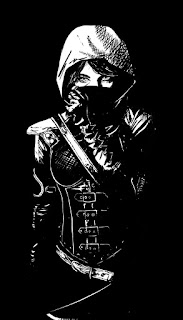Part 6
If you're just tuning in, I've been recounting how I got started with writing novels at the age of 14, developed a love of horror movies, lost my spark when author Stephenie Meyer ruined my life, and ended up where I am today.
I always tell people, "If you want to get good at writing, go work for a newspaper."
Nothing will help you write faster, better, and conquer writer's block more quickly than having to write an 800 word story twenty minutes before deadline.
I know this from experience. I did it for five years.
Journalism was a good day job for me, but, as you may recall from my last entry, that was only until Stephenie Meyer, author of those soul-destroying Twilight books, crippled my interest in writing. Once that was dead, so was my passion for journalism.
So I moved into pagination, editing, and graphic design. My work caught the attention of a local marketing company that eventually hired me to be a full time graphic artist at their small publishing house. For years I designed book covers, illustrations, graphics, websites, business cards, digital books, book trailers, bookmarks, and much, much more. In fact I still work for them on a case-by-case basis today.
An itty-bitty sampling of my work.

|

|

|

|

|

|
Seeing the world of publishing from the inside out was a unique experience. I began to see just what kinds of difficulties publishers faced, how it has become a challenge for them to make a book successful, and how risky it is to spend months—maybe even years—preparing to launch a new author's work.
I also realized just how hard it was for an author to make a living writing books. Most of our authors went nowhere. Most of them suffered from what I perceive to be the biggest misconception among writers today—being a successful writer isn't about creating good writing, it's about marketing. There are tons of great writers out there, but few of them will ever be successful because they don't know how to market.
Our writers promised us all sorts of things.
"I have a huge email list that I'm going to use to promote the book."
"I've got thousands of fans on Twitter and Facebook, and I'm going to market to them!"
"I'm going to travel around to bookstores and libraries with my book."
"I'll use my professional speaking platform to spread the word about my book."
But few of them actually followed through. Once the book came out, the excuses started tumbling in.
"I'm just too busy right now."
"My speaking engagements are not really for my book."
"My email list is technically for my company, not myself."
"I didn't really have a good marketing plan."
"I don't know what to do!"
So the little marketing/publishing company that I worked for found itself losing lots of money. They couldn't afford to keep me on staff, but they didn't want to let me go either. They decided to cut my hours to part time while they reevaluated their business in hopes of hiring me back again if/when things picked up.
And then I found myself with about 20 extra hours a week on my hands. I spent some of it investing in some projects around the house that needed tending, and I did eventually get a part time job driving package trucks for UPS to help make ends meet.
But the real kick in the brain pan came when I got an unexpected check from Amazon.
Remember those two books I co-authored with my friend Mitch?
Well, after our publishing company failed to uphold their end of our contract, we asked for our books back. They begrudgingly agreed. Then, in an attempt to please our minuscule number of fans, we re-published the books on our own. (I had spent enough years designing books that setting them up was a breeze.) And the ebooks sold like hot cakes!
And that check from Amazon? It was almost enough to pay the mortgage that month. Wowzers!
I used to think there was no money in writing novels, but I was wrong. There was money to be had, but the method of getting it had changed.
My muse was coming alive again.
To be continued...














